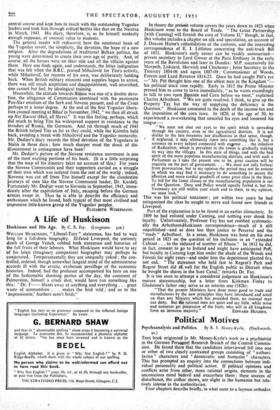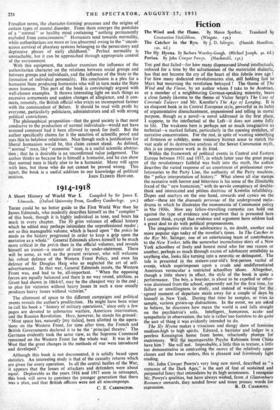Political Motives _ Psychoanalysis and Politics. By R. E. Money-Kyrle.
(Duckworth.
9$.)
THIS book originated in Mr. Money-Kyrle's work as a psychiatrist in the German Persionel Research Branch of the Control Commis- sion. He found there that the candidates interviewed fell into one or other of two clearly contrasted groups consisting of -" authori- tarian " characters and " democratic and humanist " characters. This has prompted an enquiry into the connections between indi- vidual personality and political action. If political opinions and conflicts arise from other, more rational origins, elements in the unconscious mind bedevil and exacerbate them ; these sources of disturbance, the author shows, are slight in _ffie humanist but rela- tively intense in the authoritarian.
Four chapters describe briefly, in what seem to a layman orthodox Freudian terms, the character-forming processes and the origins of certain types of mental disorder. From them emerges the postulate of a " normal " or healthy mind containing " nothing permanently excluded from consciousness." Humanists tend towards normality, while authoritarians are more or less abnormal owing to the " uncon- scious survival of phantasy systems belonging to the persecutory and depressive phases of early childhood." Perfect normality is unreachable, but it can be approached through appropriate control of the environment.
With this equipment, the author examines the influence of the authoritarian character on the relations between social groups and between groups and individuals, and the influence of the State in the formation of individual personality. His conclusion is a plea for a humanist State producing humanists who will in turn make the State more humane. This part of the book is convincingly argued with well-chosen examples. It throws interesting light on such things as excessive armaments and sudden changes of allegiance, and it con- nects, remotely, the British official who evicts an incompetent farmer with the commandant of Belsen. It should be read with profit by everyone, particularly politicians, administrators and all with strong political convictions. The philosophical proposition—that the good society is that most conducive to the production of normal individuals—would not have aroused comment had it been allowed to speak for itself. But the author specifically claims for it the sanction of scientific proof and uses this to belabour relativism. Nice though such a justification for liberal, humanism would be, this claim cannot stand. As defined, " normal " man, like " economic " man, is a useful scientific abstrac- tion ; that he is desirable is an unconfirmed value judgement. The author thinks so because he is himself a humanist, and he can show that normal man is likely also to be a humanist. Many will agree with him, but those who do not cannot be proved wrong. This apart, the book is a useful addition to our knowledge of political































 Previous page
Previous page